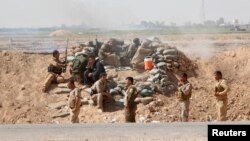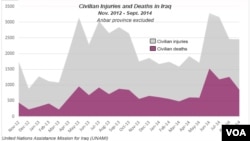Kurdish Peshmerga fighters have recaptured the Rabia border crossing between Iraq and Syria, while Kurdish fighters in northern Syria continue trying to resist advancing Islamic State militants. Inside Iraq, some reports say the militants have advanced to positions 20 kilometers outside the capital Baghdad.
Amateur video showed people scattering after a car bomb exploded in front of a school in Syria's third largest city of Homs. Syrian state media said 10 children died in the bombings. The Syrian Observatory for Human Rights reports a much higher toll, with at least 40 young students killed. It remains unclear who carried out the attack.
In northern Syria near the Turkish border, Kurdish fighters battled Islamic State militants on the outskirts of the besieged Kurdish town of Ayn al Arab, also known as Kobani to Kurds. Al Arabia TV reported that the militants beheaded more than half a dozen captured Kurdish fighters.
Hundreds of raids
Amateur video showed billowing plumes of white smoke on the outskirts of Kobani after airstrikes on militant positions by coalition allies. Pentagon spokesman Admiral Richard Kirby indicated 310 raids have taken place in Iraq and Syria since the air campaign began in August.
Rami Abdel Rahman of the Syrian Observatory for Human Rights told VOA that coalition warplanes destroyed an Islamic State tank, but the militants have advanced to just two kilometers from Kobani.
One Kurdish refugee complained the situation was “going from bad to worse,” and Islamic State militants were “attacking everyone,” not just Kurds. Another refugee insisted the militants were calling everyone “infidels,” or “kufar” in Arabic.
A Kurdish Peshmerga officer told Iraqi TV his men succeeded in dislodging Islamic State militants from the crucial Rabia border crossing between Iraq and northern Syria. Arab TV channels reported Syrian Kurdish fighters and members of the Shammar Tribe helped with the operation.
Myriad factions
Iraqi state TV reported the Anbar provincial council has set up a “national guard” force of about 500 men, with Iraqi government approval. Islamic State militants currently control Anbar's second largest city of Falluja, but not the provincial capital Ramadi.
Middle East analyst Nadim Shehadi of Chatham House in London said the Islamic State militant group is made up of many sub-groups, and is not the monolithic organization being described by many in the media:
“ISIL is not the organization that we think it is. ISIL is composed of too many components. Inside are the former Ba'athists, the [Kurdish] Nachshabandis, the tribes that are against [former Prime Minister Nouri] Maliki, and who have been let down by the American pullout after they collaborated with the 'surge' [in 2008].”
Shehadi said the current conflict has “reshuffled all the cards and there is confusion [in US policy circles] over who is a friend and who is an enemy."





